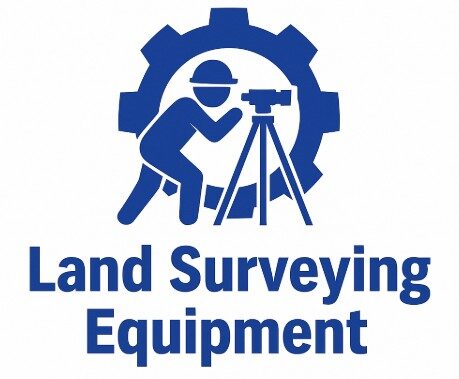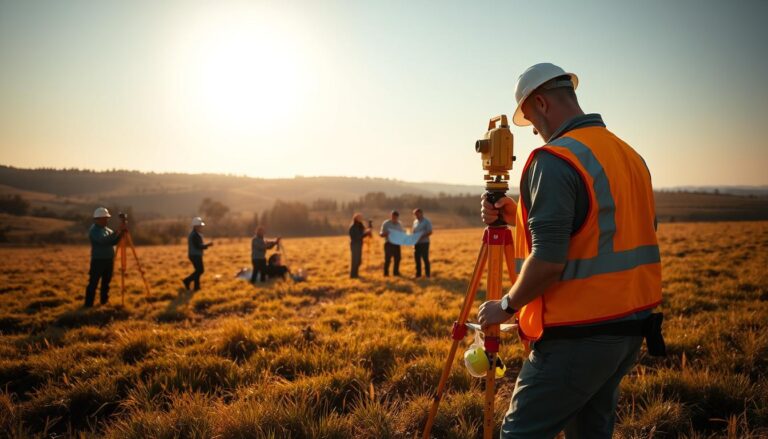From Rodman to Registered Surveyor: Your Blueprint for Career Growth
Every seasoned surveyor once started at the bottom – sweating bullets, dodging hornet nests, and wondering if they’d ever move beyond holding a prism pole. The good news? There’s a proven path from Rodman to Registered Surveyor (and beyond). The bad news? Most people get stuck because they don’t know the rules of the game. Let’s break down the real roadmap to climbing the ladder – without losing your sanity or your steel-toe boots.
Starting a surveyor career is both rewarding and challenging. New graduates usually begin with construction firms. They take on roles like assistant estimators or project managers.
As they move forward, they become key to the firm’s or project’s daily operations. It’s important to know the career growth chances in surveying for professional growth.
The path from an entry-level role like Rodman to becoming a Registered Surveyor has many steps. It needs dedication, hard work, and a good grasp of the surveying career ladder.
Key Takeaways
- Understanding the surveying career ladder is crucial for professional development.
- New graduates often start with construction firms in roles like assistant estimators or project managers.
- Career growth in the surveying profession involves several stages.
- Dedication and hard work are necessary to progress from an entry-level position to a Registered Surveyor.
- A clear understanding of the surveying profession’s career path is essential.
The Surveying Career Ladder: Understanding Your Path Forward
Knowing your career path in surveying is key for growth. The surveying field has different levels, each with its own duties and needs.
Entry-Level Positions: Rodman and Assistant Roles
Beginners often start as a rodman or in assistant roles. These jobs are the first step, offering hands-on learning and surveying exposure.
Key Responsibilities and Expectations
As a rodman, you help set up and use surveying tools, keep records, and aid senior surveyors. Showing a readiness to learn and use new tech is crucial.
Typical Duration and Growth Indicators
Entry-level jobs usually last one to three years. Signs of growth include being able to work alone, knowing surveying basics, and using industry software.
Mid-Level Growth: Instrument Operator to Party Chief
With experience, you move up to roles like instrument operator and party chief. These jobs need advanced skills and leadership.
Critical Skills Development at This Stage
At this level, focus on mastering complex equipment, analyzing data, and managing teams. These skills are vital for moving up.
Common Challenges and How to Overcome Them
Challenges include learning new tech and handling fieldwork in different conditions. To beat these, keep learning and solve problems effectively.
Advanced Positions: Office Technician and Project Manager
Advanced roles shift from fieldwork to office jobs, like office technician and project manager. These need technical know-how and management skills.
Transitioning from Field to Office Work
Switching to office work means focusing on data analysis, reports, and project planning. It demands strong organizational and technical abilities.
Building Management Capabilities
To manage, you need to develop leadership, understand project management, and oversee projects from start to finish.
Professional Achievement: Becoming a Licensed/Registered Surveyor
Becoming a licensed or registered surveyor is the top achievement. It requires lots of experience, passing a professional exam, and meeting state rules.
The Final Steps to Professional Status
To get licensed, prepare for and pass the exam, gain enough experience, and apply for licensure.
What Life Looks Like as a Registered Surveyor
As a registered surveyor, you’re respected and responsible. You lead complex projects and help build infrastructure and communities.
Essential Skills That Propel Your Surveying Career Forward
To move your surveying career forward, you need to learn many important skills. The surveying field is complex. It requires technical knowledge, professional skills, and management abilities.
Foundational Skills for Entry-Level Surveyors
For beginners, learning the basics is key. These include:
- Understanding surveying principles and practices
- Knowing how to use surveying equipment and software
Technical Abilities That Get You Noticed
Entry-level surveyors should work on technical skills. This means improving at data collection, using instruments, and analyzing data.
Work Habits That Impress Supervisors
Good work habits are important. These include being on time, paying attention to details, and wanting to learn more. In construction, reliability is crucial because of the long hours and tight deadlines.
Technical Proficiencies for Mid-Level Advancement
As you move up in your career, you’ll need to learn more advanced technical skills.
Software and Equipment Mastery
Knowing how to use surveying software and equipment is essential. This includes being skilled with GPS, total stations, and CAD software.
Problem-Solving and Decision-Making Skills
Surveyors need to analyze data, spot problems, and make smart decisions. Problem-solving skills are crucial for moving up.
Management and Coordination Skills for Leadership Roles
If you want to lead, you need to focus on management and coordination skills.
Team Leadership and Project Management
Good surveyors can lead teams and manage projects well. They ensure projects are done on time and to a high standard.
Client Communication and Relationship Building
Building strong relationships with clients is key. Clear communication is vital for success in leadership roles.
Professional Expertise Required for Licensure
To get licensed, you must show you’re a professional.
Legal Knowledge and Professional Standards
It’s important to know the law and professional standards. This includes surveying laws and ethical practices.
Business Operations Understanding
Understanding business operations is necessary. This includes management and financial aspects, for both licensure and career growth.
Education and Certification Pathways to Success
Educational paths and certifications are key for surveying careers. A solid education is crucial for moving up in this field.
Formal Education Options: Degrees and Programs
Surveying careers offer many educational paths. You can choose from associate and bachelor’s degrees. Your choice depends on your career goals and how specialized you want to be.
Associate vs. Bachelor’s Degree Considerations
An associate degree gives you basic knowledge and skills for entry-level jobs. But, a bachelor’s degree is better for advanced roles. It covers more about surveying, law, and technical skills.
Specialized Surveying Programs
Some schools have special surveying programs. They teach GIS, geodesy, and cartography. These programs boost your technical skills and job chances.
Certification Pathways and Requirements
Certifications are key for moving up in surveying. They show you’re skilled and follow professional standards.
Industry Certifications Worth Pursuing
Certifications like CST and PLS are highly valued. You need to pass exams and meet education and experience needs.
Preparation Strategies for Certification Exams
Getting ready for exams takes education, work experience, and study. Use study guides and review courses to get ready.
State-Specific Licensing Requirements
Licensing rules for surveyors differ by state. It’s important to know the rules in your state.
Navigating Different State Regulations
It’s crucial to follow state-specific rules. This might mean passing a state exam or having enough work experience.
Reciprocity Between States
Some states let licensed surveyors work in other states without extra licenses. Knowing about these agreements helps your career move.
Continuing Education for Career Advancement
Keeping up with new tech and laws is vital. Continuing education helps you stay current.
Required vs. Strategic CE Courses
Some CE courses are needed to keep your license. But, you can also take courses that help your career goals.
Making the Most of Professional Development
Professional development, like workshops and conferences, boosts your skills and network. It helps your career grow.
From Rodman to Registered Surveyor: Your Blueprint for Career Growth
To move from a rodman to a registered surveyor, you need a clear plan. Understand your current role, set goals, and track your progress.
Creating Your Personal Career Development Plan
Start by making a career plan. First, look at your current skills and job.
Assessing Your Current Position and Skills
Check your skills, experience, and qualifications. See where you’re strong and where you need to improve. Ask colleagues or mentors for their opinions.
Defining Clear Career Milestones
Set clear, measurable goals. For example, aim to be an instrument operator in a year or get a certain certification. Break big goals into smaller steps.
Setting Realistic Timeframes for Advancement
Know the usual time it takes to move up in your field. But also, find ways to speed up your career without getting too stressed.
Industry-Standard Progression Timelines
Progress in surveying can be quick, with more responsibility soon. For example, going from a rodman to a party chief might take a few years, based on your work and chances.
Accelerating Your Journey Without Burning Out
To move faster, learn new skills, take on more tasks, and get mentorship. Keep a good balance between work and life to avoid getting too tired.

Measuring Progress and Adjusting Your Strategy
Check how you’re doing against your goals often. Use important performance signs like how many projects you finish or how happy clients are.
Key Performance Indicators for Career Growth
Some important signs to watch include:
- Project completion rates
- Client satisfaction scores
- Professional development courses completed
- Certifications achieved
When and How to Pivot Your Approach
If you’re not hitting your targets, it’s time to change your plan. This might mean more training, a new job, or a different company.
By sticking to your plan and staying focused, you can make it from rodman to registered surveyor.
5 Secrets to Getting Promoted Faster in Surveying Firms
To move up in surveying, you need more than just skills. You must have a plan for growing professionally. This plan should cover many areas of your work.
Secret #1: Mastering Technical Skills Beyond Your Current Role
To get ahead, you must master technical skills that go beyond your job now. Look for skills that your firm really needs.
Identifying High-Value Skills to Develop
Focus on skills that are key for your firm’s success. For example, learning about advanced surveying equipment is important. It makes you more valuable and prepares you for bigger roles.
Self-Learning Strategies That Work
Good self-learning includes online courses, workshops, and getting a mentor. These help you keep up with new tech and methods.
Secret #2: Developing Business Acumen and Client Relationship Skills
Having business acumen and client relationship skills is key for moving up. It means knowing the business side and connecting well with clients.
Understanding the Business Side of Surveying
It’s important to know the business side of your firm. This includes managing projects, budgets, and what clients expect.
Building Client Trust and Loyalty
Building trust with clients is crucial for getting more work and referrals. Do great work, listen to clients, and keep in touch.
Secret #3: Becoming the Go-To Problem Solver
Being the go-to problem solver can really help your career. It means solving problems well and being proactive.
Cultivating a Solution-Oriented Mindset
Be proactive in solving problems. Anticipate issues and come up with new solutions.
Handling Difficult Field and Office Challenges
Dealing with tough situations is important. Be flexible, communicate well, and stay calm under pressure.
Secret #4: Building a Professional Network Within the Industry
Building a professional network is vital for growing. Network in groups and use connections for job chances.
Strategic Networking in Professional Organizations
Go to industry events, join groups, and use online forums. This expands your network and keeps you updated.
Leveraging Relationships for Career Opportunities
Good relationships can open doors to new jobs, projects, and mentors.
Secret #5: Documenting Achievements and Communicating Value
Documenting achievements and showing your worth is key for moving up.
Creating a Professional Portfolio
Keep a portfolio that shows your skills and what you’ve done. It proves your value to your employer.
Effective Self-Advocacy in Performance Reviews
Be ready to talk about your achievements and goals in reviews. This shows you’re serious about your career.
How to Future-Proof Your Surveying Career
To keep your surveying career strong, you need to stay ahead of new tech and changes in the field. As the surveying world evolves, you must be ready to adapt and grow.

Emerging Technologies Reshaping the Surveying Industry
New technologies are changing how surveyors work. Two big changes are:
Drone Technology and Aerial Mapping
Drones with high-tech cameras and sensors are making data collection better. They offer unparalleled accuracy and efficiency in aerial mapping and surveying.
3D Scanning and Digital Twins
3D scanning tech lets us make exact digital models, or digital twins, of real places. This improves project planning and execution.
Essential Technical Skills for the Modern Surveyor
To stay relevant, surveyors need to improve their technical skills.
GIS and Data Management Proficiency
Knowing Geographic Information Systems (GIS) and data management is key. It helps in analyzing and understanding the data from surveying projects.
Programming and Automation Knowledge
Understanding programming and automation tools boosts a surveyor’s productivity. It also helps in coming up with new ideas.
Soft Skills That Will Always Remain Valuable
Soft skills are just as important as technical ones for success in surveying.
Communication and Collaboration
Communication and teamwork are crucial. They help in managing projects, solving problems, and achieving goals.
Adaptability and Continuous Learning
Being able to adapt to new technologies and methods is key in a fast-changing field.
Building Your Personal Brand as a Surveying Professional
Creating a strong personal brand sets you apart in a competitive job market. It opens up new career paths.
Online Presence and Digital Reputation
Having a professional online presence is crucial. It shapes how others see you, including peers, employers, and clients.
Thought Leadership and Industry Contributions
Being a thought leader and contributing to industry talks boosts your reputation. It makes you more visible in the surveying world.
By embracing new tech, honing technical and soft skills, and building a strong personal brand, surveyors can secure their future. They can achieve lasting success in their careers.
Small Firm vs. Big Firm: Navigating Different Career Paths
The surveying industry has many career paths. Small and big firms offer different chances and challenges. Knowing these differences is key for surveyors looking to grow their careers.
Advantages and Challenges in Small Surveying Firms
Small surveying firms are great for those who like hands-on work and a variety of tasks.
Broader Responsibility and Faster Advancement
Employees in small firms do many things. This gives them a lot of experience and can help them advance quickly.
Limited Resources and Specialization
But, small firms might not have much to offer in terms of specialization. Employees need to be flexible and do many things.
Opportunities and Obstacles in Large Companies
Big surveying firms have clear career paths and specialized roles. But, it can be tough to move up in their complex structures.
Structured Advancement and Specialized Roles
Big firms have clear paths for career growth and specialized areas. This allows for deeper knowledge in specific fields.
Navigating Corporate Hierarchies
But, the strict hierarchy can make it hard to get to the top. There’s a lot of competition for senior positions.
Strategies for Success in Each Environment
To thrive, surveyors need to adjust their approach based on the firm’s size.
Small Firm Success Tactics
- Be ready to handle different tasks.
- Look for chances to grow professionally.
Large Organization Career Strategies
- Work on developing specific skills.
- Build a strong network within the company.
When and How to Make the Switch Between Firm Sizes
Surveyors might need to switch between small and big firms at some point. The right time and plan are crucial.
Strategic Timing for Career Moves
It’s best to switch during times of growth or when new chances come up.
Transferring Skills Between Different Environments
Highlight skills that are useful in any setting, like managing projects and working with clients, when moving between firm sizes.
Overcoming Common Career Advancement Obstacles
Surveying professionals face many challenges on their career paths. They need technical skills, strategic planning, and the ability to adapt. As they grow, they meet obstacles that can slow their progress.
Dealing with Limited Advancement Opportunities
One big challenge is finding few chances to move up in their current job. To tackle this, they can:
- Take on more tasks or suggest new projects to grow.
- Look for a new job if there’s no room for advancement where they are.
Creating Growth Where None Exists
Surveyors can make their own opportunities by volunteering for new challenges. This shows their skills and can lead to new roles.
When to Consider a Job Change
If there’s no chance to advance, it’s time to explore other options. Think about your career goals and if a new job fits them.
Navigating Office Politics and Competition
Office politics and competition can be tough. To handle them well, focus on:
- Building alliances without losing your integrity.
- Being noticed for your work without stepping on others.
Building Alliances Without Compromising Integrity
It’s important to build good relationships at work. Be collaborative and supportive to your colleagues for a positive work environment.
Standing Out Without Stepping on Others
To be noticed, highlight your unique strengths and contributions. Make sure your work is visible and valued by your team.
Balancing Field Experience with Office Expertise
It’s crucial to balance field work with office skills. Surveyors need to move easily between these roles while keeping their technical skills sharp.
Transitioning Between Field and Office Roles
Be ready to develop new skills as you switch roles. This flexibility is key to moving up in your career.
Maintaining Technical Skills While Advancing
Keep learning and training to stay technically proficient. Stay updated with the latest in the field through ongoing education.
Addressing Knowledge Gaps and Skill Deficiencies
It’s important to identify and fix knowledge gaps and skill shortages. Surveyors should:
- Do honest self-assessments to find areas for improvement.
- Seek targeted learning and mentorship to fill these gaps.
Honest Self-Assessment Techniques
Use self-reflection and feedback from others to find areas to improve.
Targeted Learning and Mentorship
After finding areas to improve, look for relevant training programs or mentorship. This will help enhance your skills and knowledge.
Real-World Success Stories: Surveyors Who Made It to the Top
The surveying industry is full of stories of people who started small and reached the top. These tales show the chance for career growth and professional growth in the field.
Case Study: From Rodman to Firm Partner
A surveyor began as a rodman and became a firm partner. This journey was filled with important choices and smart career steps.
Key Decision Points and Career Moves
The surveyor’s climb included taking on more duties, improving technical skills, and growing their professional network.
- Pursuing advanced certifications
- Seeking mentorship from experienced professionals
- Embracing leadership roles in projects
Lessons from the Journey
The surveyor learned the value of being adaptable, always learning, and good communication for career growth.
Case Study: Building a Specialized Expertise
Another success story is a surveyor who became an expert in a specific area, like hydrographic surveying or geodetic surveying.
Identifying and Developing a Valuable Niche
This involved finding areas with demand and improving skills through specific training and experience.
Leveraging Specialization for Career Advancement
By becoming known as an expert in their niche, the surveyor used their specialization to get ahead in their career.
Case Study: Creating Your Own Surveying Business
Some surveyors have found success by starting their own businesses. This path needs careful planning and timing.
Preparation and Timing for Entrepreneurship
This means creating a business plan, getting funding, and knowing what the market wants.
Building a Successful Independent Practice
Important factors include building a strong network, offering top-notch services, and keeping up with industry changes.
Key Lessons from Successful Career Transitions
Looking at these success stories, we see common patterns and lessons for surveyors aiming to advance.
Common Patterns in Surveying Success Stories
- Dedication to continuous learning
- Strategic career planning
- Effective networking
Applying These Lessons to Your Own Career
By learning from these stories, surveyors can plan their own path to success and reach their career goals.
Conclusion: Charting Your Course to Surveying Success
As constructors aim to meet tight deadlines, a well-thought-out surveyor career is key. Understanding the journey from rodman to registered surveyor helps create a career plan. This plan includes learning essential skills, getting the right education and certifications, and making smart career choices.
Success in surveying comes from a mix of technical skills, business knowledge, and soft skills. By improving in these areas and being open to change, surveyors can move up and thrive in their field.
To reach surveying success, set clear goals, track your progress, and tweak your plan when needed. Following the advice in this article, aspiring surveyors can confidently guide their career path and reach their goals.






